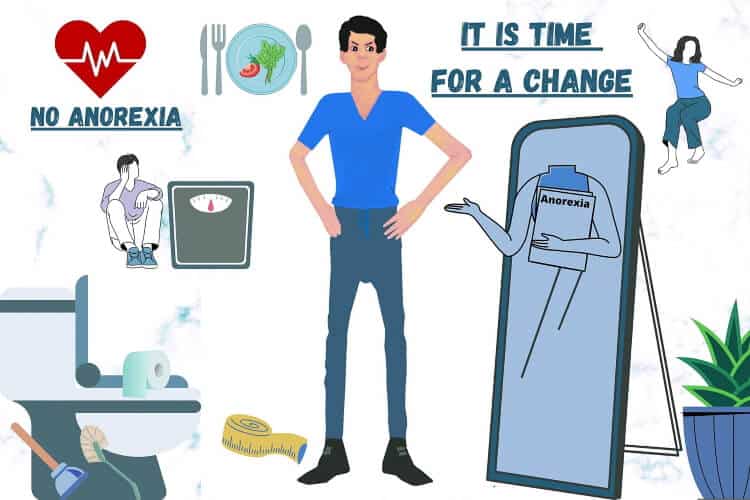The world is fortunately a changing place, and there is now a greater awareness of people’s mental health issues and problems, and more tolerance of the struggles that people can have with life issues that increasingly affect the youth of today. The internet plays a big part in this. First it increases awareness of the issues. However it also has a detrimental effect in that social media sites such as Instagram, which have photoshopped images of both women and men, can have an adverse impact on people’s thoughts in terms of how they see their own body image. This can create an internal, serious mental conflict.
Eating disorders are serious mental illnesses which affect people of all ages, ethnicities, genders and backgrounds. People with eating issues will use dysfunctional eating behaviour as a way to cope with difficult situations and feelings. This behaviour can include eating less and conversely eating large amounts at one sitting, eating during the night rather than sleeping and getting rid of the food that has been eaten by making themselves vomit, using laxatives, fasting, or excessive exercise or any combination of these behaviours.
It is important to remember that having problems with food and eating are about a person’s feelings and not about the food itself. The initial feelings would have triggered the eating disorder and the way the person treats food may make them feel more able to cope.
Gone are the days of people associating eating problems simply with eating too much or too little. There are now 5 types of eating disorders that are recognised by both doctors and psychologists that have a valid medical diagnosis coding of ICD or DSM.
Anorexia Nervosa or commonly just called Anorexia.

This is probably the most common and widely recognised, it is also the deadliest as it the condition that has registered the highest mortality rate. The behavioural pattern involves severe food restriction and can be coupled with excessive exercise by running or going to the gym, often to the extreme on a daily basis. There is also usually a daily purging of the body and other signs, and symptoms are:
- Fear of gaining weight, daily checking of weight using scales.
- Losing weight rapidly and always looking undernourished
- Ultimately, women will stop menstruating due to low fat body content
- The cardiovascular system becomes stressed, and this can lead to heart damage
- Constant vomiting will affect the enamel on teeth.
Vomiting can also alter the throat cells from the stomach acid which in turn can then cause Barretts disease in the oesophagus.
Bulimia Nervosa,
this occurs when someone is binging on large amounts of food and will then, when finished gorging, purge the body. Purging usually consists of the individual forcing themselves to vomit up the food. This may not be daily and there can be gaps between each binge. Ultimately, though, over a period of time it will probably become a daily action. Because the gap between eating and purging is short then there is very little goodness taken from the food by the body. The binging and purging combined will again lead to potentially dangerous physical symptoms.
Muscle Dysmorphia
This will affect more men than women and it develops due to an obsession with physique and the development of a muscular body. This may escalate to injecting steroids or other liquids to try and enhance a muscular frame. The individual will fixate on developing a body image that is clear in their mind and will go to any length to try and achieve it.
Binge Eating Disorder
This is similar to Bulimia Nervosa but the person in this case will be consuming an excessive amount of food within a 2-hour period, and it is not followed by any purging. The binge periods are followed by intense feelings of guilt, shame, sadness, anger and remorse and the individual’s weight will gradually balloon over time and then they will choose to isolate from the world but carry on with the behaviour ultimately becoming obese.
OSFED stands for Other Specified Feeding or Eating Disorder
This term is for those diagnosed that don’t just fit in to the above categories. These extra categories are not recognised by an ICD or DSM coding. A person can potentially be diagnosed by a GP or Consultant with a typical Anorexia or Bulimia plus one of the following unofficial categories which are all recognised by mental health scientists.
Compulsive Overeating
This again is similar to binge eating but the difference with COE is that the binge is not in spurts, but the individual will eat large amounts of food all day long
Prada Willi Syndrome
This is a syndrome that starts in babies with poor feeding leading to weak muscles and slow development. Then in childhood there develops insatiable hunger and in this childhood stage they will develop diabetes and struggle to adapt to a normal lifestyle
Diabulimia
This occurs when someone who is diabetic will use their insulin prescription as a means to lose weight.
Orthorexia Nervosa
This is where an individual becomes so obsessed with planning a perfect diet that it ultimately disrupts their life as they end up only feeling safe in their home environment.
Selective Eating Disorder
This is the next level to Orthorexia where an individual becomes so selective about their food and will end up having the same two meals each day which results in an unhealthy diet causing physical problems.
Drunkorexia
This is the term used for someone with an eating disorder combined with an alcohol addiction. The individual will purge food in order to save calories for alcohol. If this condition goes untreated then severe malnutrition will set in very quickly.
Pregorexia
This is where some women will go into a pregnancy with a plan to lose weight or try and keep their weight stable during the pregnancy. This condition can lead to low birth weight, miscarriage, coronary heart disease, stroke, hypertension, depression and type 2 diabetes.
